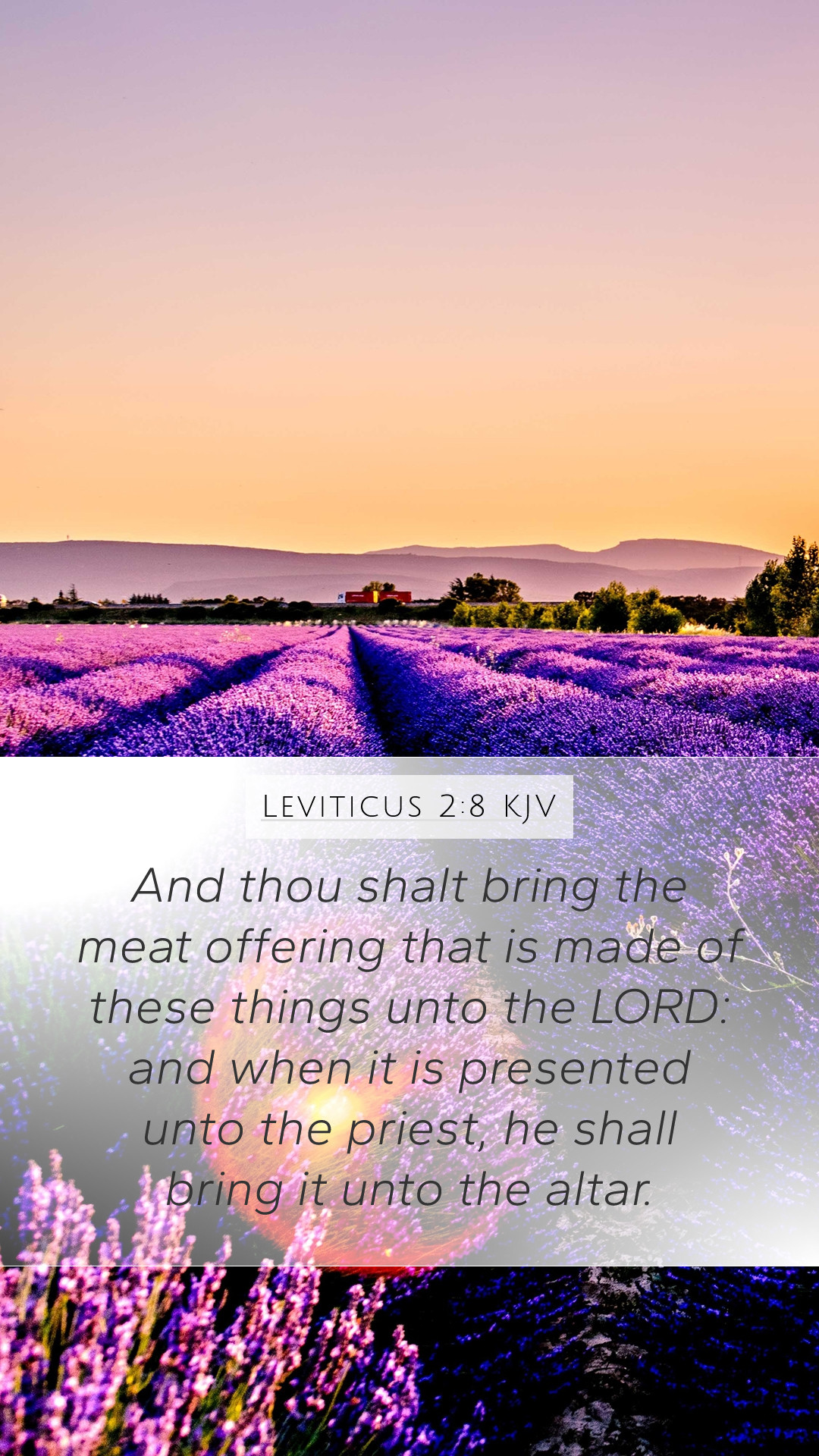Understanding Leviticus 2:8
The verse Leviticus 2:8 states:
"And thou shalt bring the meat offering that is made of these things unto the LORD: and when it is presented unto the priest, he shall take from it his handful of the flour thereof, and of the oil thereof, and all the frankincense thereof; and the priest shall burn the memorial of it upon the altar, to be an offering made by fire, of a sweet savour unto the LORD."
This verse is part of God’s instructions regarding the grain offerings that the Israelites were to bring before the Lord. This offering is significant in understanding the broader context of worship, acceptance, and dedication to God.
Bible Verse Meaning and Commentary
The analysis of Leviticus 2:8 brings forth several important insights:
- Significance of Offerings: Offerings represented the worshipper's acknowledgment of God’s provision and a desire for personal communion with Him. Matthew Henry highlights the requirement for offerings to be brought to God, emphasizing their role in worship.
- Dedication of the Offering: The phrase "made of these things" refers to the specific components of the offering, which illustrates how specific and heartfelt worship should be undertaken. Albert Barnes points out that the flour, oil, and frankincense imply a certain reverence and care in presenting an offering to God.
- The Role of the Priest: Adam Clarke focuses on the priest's role in the offering process. The priest serves as a mediator between the people and God, taking a handful of the offering as an act of representing the people before God.
- Sweet Savour to the Lord: The notion of a “sweet savour unto the Lord” indicates that God finds pleasure in the sincere offerings made by His people. It symbolizes acceptance and the desire for a relationship with God.
- Memorial Offering: The term "memorial" signifies that the offering is a reminder of a tribute to the Lord, connecting to the broader theme of remembrance throughout the Scripture. This aligns with the idea expressed in Hebrews 13:15 regarding the offering of praise as a form of worship.
- Spiritual Symbolism: Grain offerings symbolize gratitude and the acknowledgment of God’s blessings, representing the fruits of one’s labor as an act of thanksgiving. It teaches about commitment and recognition of God’s providence.
Application and Biblical Exegesis
Understanding Leviticus 2:8 not only provides insight into the sacrificial system of the Old Testament but also guides modern believers in their approach to worship and offerings:
- Worship Strategy: Modern-day worship can take cues from the carefulness of presenting offerings to God, reflecting on the heart of worship being as important as the act itself. It's a scriptural principle that can be applied to individual worship life.
- Gratitude in Giving: Reflecting on this verse encourages one to cultivate a spirit of gratitude when giving to God’s work, understanding that everything we have comes from Him, akin to the principles outlined in 2 Corinthians 9:7.
- Role of Spiritual Leaders: Just as priests had an essential role in the temple, church leadership today guides worshippers in their spiritual offerings which include prayer, service, and resources.
- Heart of Sacrifice: This verse teaches the importance of self-sacrifice and dedication in our spiritual lives. Christians are called to present their bodies as living sacrifices (Romans 12:1) which corresponds to the grain offering as an act of worship.
Cross References
Leviticus 2:8 connects with several other scriptures that underscore themes of worship and offerings:
- Exodus 29:18: Discusses offerings made to God, emphasizing their acceptance.
- Leviticus 1:9: The burnt offering represents a pleasing aroma to God, similar to the grain offerings.
- Hebrews 13:15: This verse mentions the offering of praise, which resonates with bringing offerings to the Lord as a sweet aroma.
Conclusion
Grasping the meaning of Leviticus 2:8 invites a deeper understanding of how Old Testament practices of offerings inform Christian worship today. It challenges believers to approach God with sincere hearts, dedicating the fruits of their labor and lives to Him in gratitude and reverence.
Through detailed Bible study insights, individuals can further explore the meaning of Bible verses such as this, enhancing their Bible verse analysis and enriching their spiritual journey.


